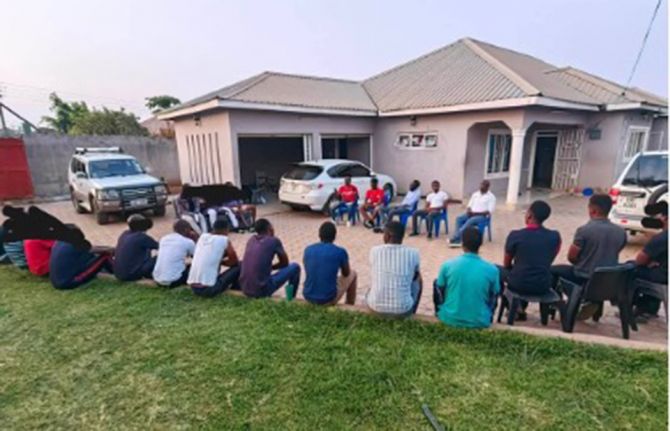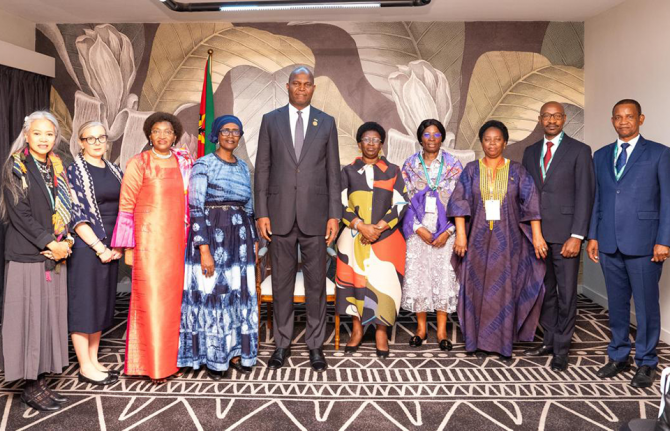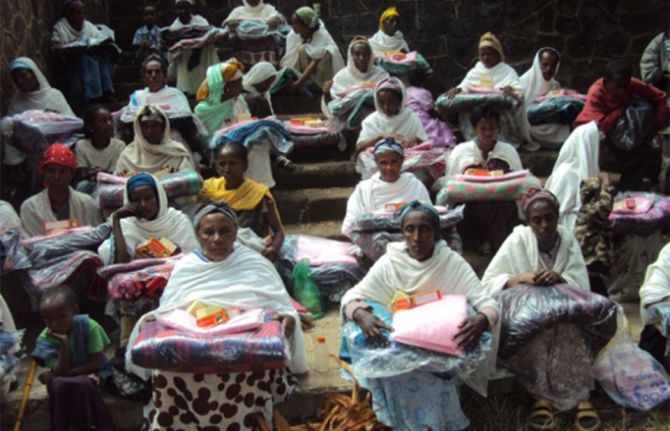
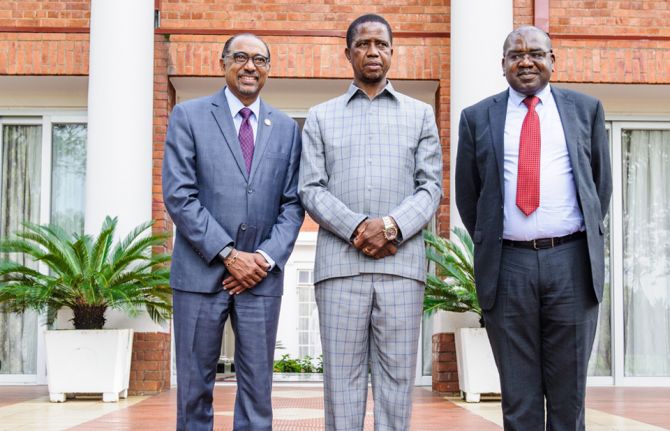

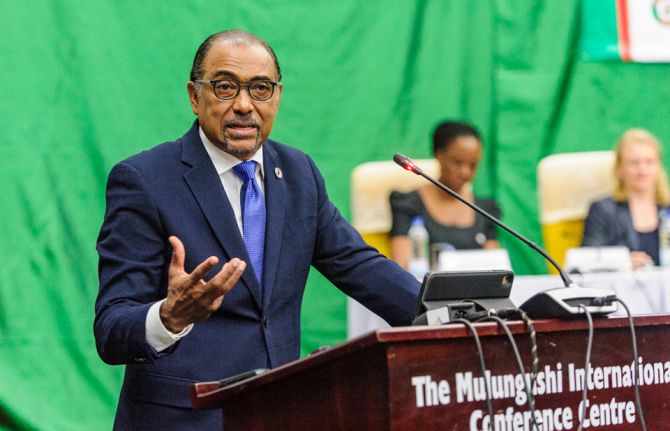
Update
New tool to Fast-Track the AIDS response in Zambia
07 March 2018
07 March 2018 07 March 2018A new tool to track progress and identify gaps in health programming in Zambia has been launched. The Zambia Integrated Health Situation Room centralizes data for HIV, tuberculosis, maternal and child health and malaria to improve programming and reach more people with services.
The situation room—the first integrated situation room in Africa—was launched on 6 March by Inonge Mutukwa Wina, the Vice-President of Zambia, and Michel Sidibé, the Executive Director of UNAIDS. It shows real-time service delivery data and produces a comprehensive picture of key health areas in Zambia.
Enabling quick feedback on results at the county and community levels, the situation room identifies bottlenecks to service delivery. It also enables programme staff to intensify local efforts to ensure that adults and children living with HIV have regular access to care and that HIV medicines are replenished quickly if stock-outs occur.
Earlier in the day, Mr Sidibé congratulated Edgar Chagwa Lungu, the President of Zambia, for his government’s leadership in ensuring that no one is left behind by the AIDS response in Zambia. Mr Lungu expressed his commitment to ensuring access to medicines and expressed his commitment to local pharmaceutical production. He reiterated his commitment to not only reach the 90‒90‒90 targets, but to make the target of reaching 100% of people living with HIV in Zambia a reality.
Quotes
“There is nothing magical or mystical about health. People are the most important resource we have in Zambia and I am committed to ensuring the highest standards of health for all Zambian citizens.”
“Zambia demonstrates that we can make a difference in the response to disease. The response of the government, civil society and communities to the recent cholera outbreak clearly shows this. We will make the dream of ending AIDS a reality.”
“Since the presidential launch of the test and treat initiative, the number of people tested for HIV and put on HIV treatment has shown a significant increase. This clearly shows that Zambia is heading in the right direction towards epidemic control.”
Region/country

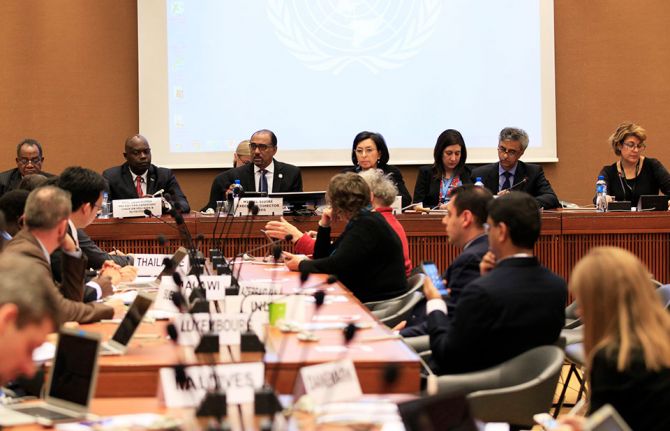
Update
Commemorating Zero Discrimination Day at a panel on HIV and human rights
05 March 2018
05 March 2018 05 March 2018The importance of confronting stigma and discrimination in order to end the AIDS epidemic by 2030 was the subject of a panel discussion on 1 March, Zero Discrimination Day. Representatives of UNAIDS, Brazil, India, Malawi and the Global Network of People Living with HIV (GNP+) highlighted good practices and appealed for action and leadership to protect and advance HIV-related human rights.
In his address, the Executive Director of UNAIDS, Michel Sidibé, called for global efforts to address HIV-related barriers, discrimination and gender inequalities, which continue to leave millions of people behind. He pointed to the human rights tools and mechanisms available as outlined in a special issue of the Health and Human Rights Journal on HIV and human rights launched that day.
Deus Gumba, Malawi Parliamentary Chair on HIV/AIDS and Nutrition, spoke about Malawi’s experience in working with stakeholders to develop a progressive HIV and AIDS Bill in 2017. Rajiv K. Chander, the Permanent Representative of India to the United Nations in Geneva, expressed India’s dedication to advancing zero discrimination in the response to HIV. He emphasized India’s leadership in ensuring access to affordable HIV treatment and adopting legislation prohibiting discrimination against people living with HIV.
The address on behalf of Laurel Sprague, Executive Director of GNP+, was delivered by Andrea Boccardi. She called on stakeholders to join a global compact to end HIV-related discrimination, an effort spearheaded by civil society.
A discussion followed in which representatives of other countries voiced their support to scaling up efforts in order to ensure accountability and action in the response to HIV.
The event was held on the sidelines of the 37th session of the Human Rights Council, held in Geneva, Switzerland.
Quotes
“If we don’t address the structural barriers, if we don’t change the policies, if we don’t make the laws more conducive, it won’t help us to reach people living with HIV. We can’t end the AIDS epidemic without zero discrimination. Zero discrimination is more than a vision, it is an obligation.”
“Stigma and discrimination and punitive laws that violate against key populations deepen people’s vulnerability to HIV and violate human rights.”
“I do believe the 90–90–90 targets and the goals of eliminating HIV as a public health threat by 2030 can only be achieved if HIV prevention, treatment, care and support services are delivered in an environment free of stigma and discrimination.”
“Ensuring access to affordable HIV treatment without discrimination is critical to realizing full equality and to save lives.”
“We must have accountability for human rights because the rights of everyone matter: we need to realize rights for everyone to be able to lead a life in dignity and equality.”
Related

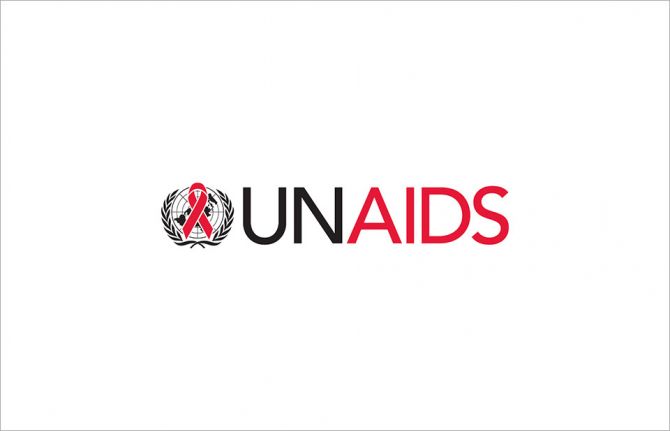
Information Note
Five-point plan to prevent and address all forms of harassment for greater accountability and transparency within UNAIDS
27 February 2018
27 February 2018 27 February 2018The Executive Director of UNAIDS, Michel Sidibé, has announced a five-point plan to prevent and address harassment, including sexual harassment, and unethical behaviour within UNAIDS. The plan will ensure that inappropriate behaviour and abuse of authority are identified early on, that measures taken are properly documented and that action to be taken follows due process and is swift and effective.
“I am putting mechanisms in place to review all UNAIDS policies on sexual harassment, abuse of authority and unethical behaviour and ensuring a professional assessment of all actions taken to date to identify if there are any gaps in implementation,” said Mr Sidibé. “This will further enhance the transparency of our processes and allow us to continue moving forward.” The five-point plan will be led by the newly appointed UNAIDS Deputy Executive Director, Management and Governance, Gunilla Carlsson.
First, focal points will be appointed in each department, country office, liaison office and regional office, who will have structured reporting mechanisms in place, reporting back directly to Ms Carlsson.
Second, an open platform will be created for staff to report on harassment, abuse of authority or unethical behaviour within the organization. The open platform will also enable staff to propose innovative options for preventing harassment.
Third, training will be stepped up, with face-to-face training to help staff recognize inappropriate behaviour, improve their skills to prevent harassment and empower them to rapidly report any cases of abuse they may encounter or witness. The training will also include recognizing unconscious bias and encourage increased understanding and tolerance within the multicultural environment of the United Nations.
Fourth, UNAIDS will develop and conduct an annual comprehensive and independent, organization-wide survey on staff well-being that includes questions on harassment, sexual harassment and unethical behaviour.
Fifth, the recently introduced performance management system will be further enhanced. As well as being evaluated on work-based performance, targets met, management effectiveness and progress achieved, staff at all levels will also be evaluated on their ethical behaviour in the workplace. A 360-degree evaluation will be incorporated as part of the assessment process.
In addition, the Executive Director of UNAIDS has announced that he will establish an external high-level independent panel made up of women leaders, civil society, government partners and experts, to provide, within 30 days, recommendations to UNAIDS to further strengthen implementation of the zero tolerance policy on sexual harassment.
The new initiatives will be integrated with a number of progressive policies that UNAIDS has already in place to facilitate the reporting of cases of abuse, including an anonymous, free, 24-hour hotline accessible from anywhere around the world. Wellness and capacity-building teams with specialized staff will visit and work with field offices or departments to address management and operational concerns in order to ensure a constructive working environment in all UNAIDS offices worldwide.
This initiative is in line with the United Nations Secretary-General’s action plan on sexual harassment. UNAIDS has been a frontrunner of United Nations reform and is leading work to ensure gender equality in the workplace. In 2013, UNAIDS launched a Gender Action Plan, which had six targets to reach to ensure gender balance across the organization, including ensuring a 50/50 gender balance in the UNAIDS Secretariat and that 50% of UNAIDS country directors are women. By the end of 2017, 48% of UNAIDS country directors were women and the gender balance across the organization was 53/47, with slightly more women working for the organization than men.
“UNAIDS’ vision stands for zero: zero new HIV infections, zero discrimination and zero AIDS-related deaths,” said Mr Sidibé. “Zero tolerance for sexual harassment is part our mission and is central to our work,” he added.
UNAIDS is continuing to strive to ensure a safe and conducive working environment for its staff in order to continue leading global efforts towards ending the AIDS epidemic by 2030.
Related


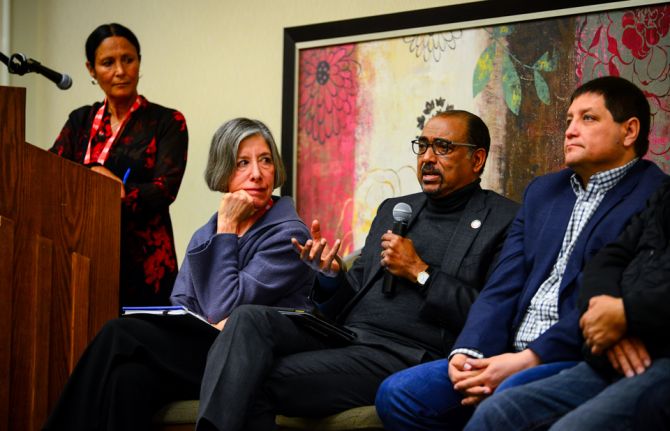
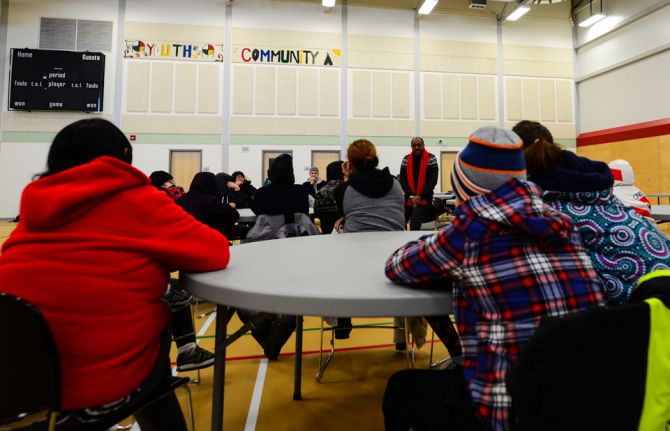
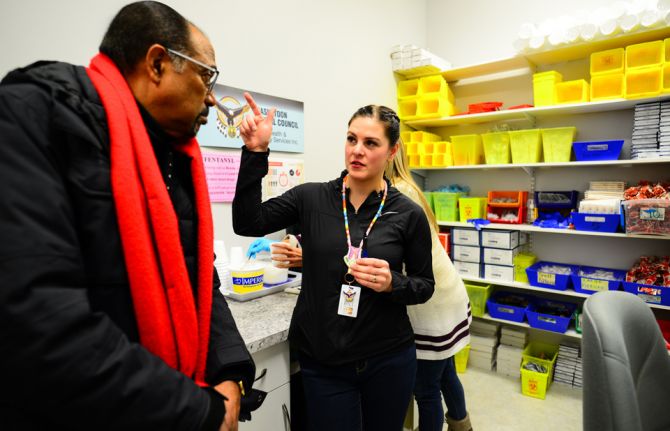
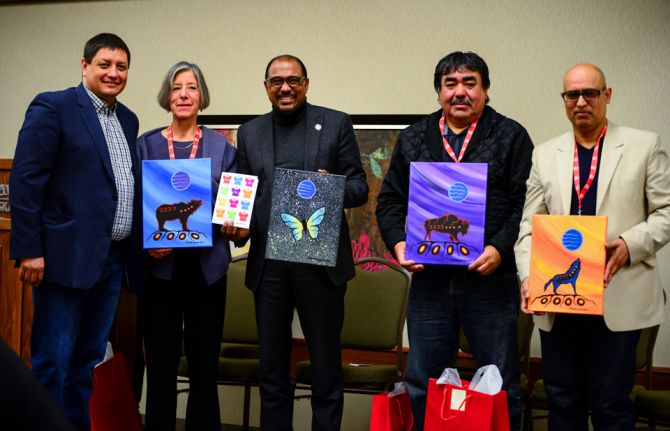
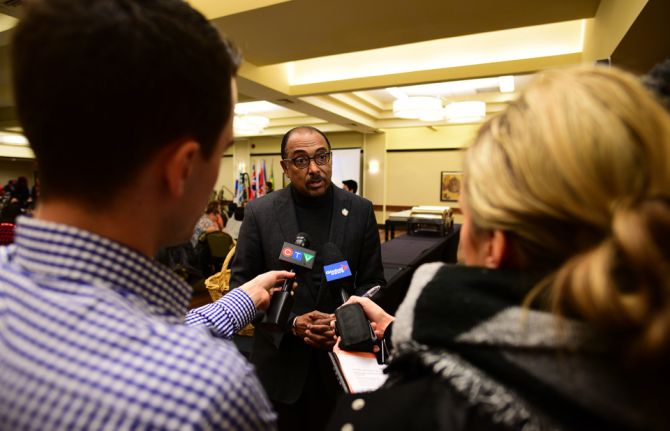
Update
A call for an HIV catch-up plan for the First Nations in Canada
27 February 2018
27 February 2018 27 February 2018Indigenous peoples the world over face exclusion and discrimination. High rates of addiction and mental illness increase their marginalization.
Among First Nations young people in Saskatchewan, Canada, suicide rates are five to seven times higher than among the general population. First Nations young people are more likely to end up in jail than to graduate from high school. Tuberculosis and HIV disproportionally affect First Nations peoples in Canada.
Reaching fragile communities such as indigenous peoples is therefore vital if the world is to end the AIDS epidemic by 2030 as part of the Sustainable Development Goals.
The Know Your Status Forum raises awareness and spurs action to increase HIV and hepatitis C testing among indigenous communities in Saskatchewan. Speaking at the opening of the second annual meeting of the Know Your Status Forum in Saskatoon on 13 February, UNAIDS Executive Director Michel Sidibé called for a catch-up plan for indigenous communities and people left behind. Point-of-care HIV testing and harm reduction should be key parts of the catch-up plan, he said.
Mr Sidibé underscored UNAIDS’ commitment to working with the Government of Canada, communities and other partners to continue to bring the voices of indigenous people into decision-making. He also announced that UNAIDS will convene an expert meeting on indigenous communities and HIV at the United Nations Permanent Forum on Indigenous Issues.
Founded by the Saskatoon Tribal Council, the Ahtahkakoop Cree Nation, the Big River First Nation and the First Nations and Inuit Health Branch, the Know Your Status Forum aims to achieve the 90–90–90 targets among the First Nations people. The 90–90–90 targets are that, by 2020, 90% of people living with HIV know their HIV status, 90% of people who know their HIV-positive status are accessing treatment and 90% of people on treatment have suppressed viral loads.
Before attending the Know Your Status Forum, Mr Sidibé visited the Saskatoon Tribal Council Health Centre, the One Arrow First Nation Reserve and the White Buffalo Youth Lodge. He met with health and community workers, young people and other community members and heard about the impact of intergenerational trauma being played out through a drug crisis and an epidemic of mental illness.
Quotes
“We will never achieve the Sustainable Development Goals, including ending the AIDS epidemic, without addressing the drug crisis and epidemic of mental illness destroying communities. We have to reach fragile communities everywhere.”
“The single most important change needed is restoring families. Everyone has to know that somebody cares about them.”
“We need to treat people as people, not as a disease.”
“Drugs and alcohol are symptoms of underlying pain. To address the drugs and alcohol, we have to address the pain.”
Region/country

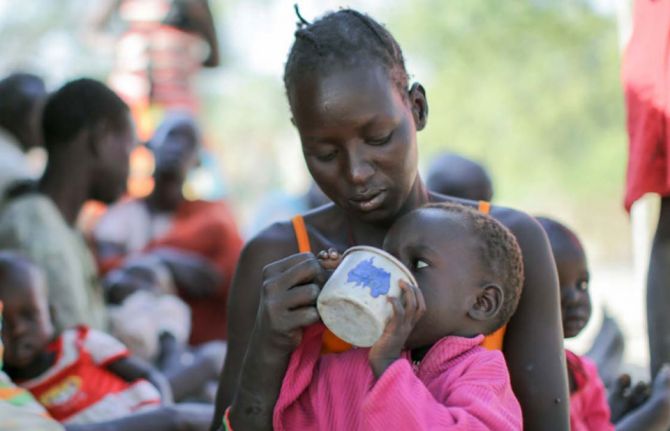
Update
Time to act in South Sudan
09 February 2018
09 February 2018 09 February 2018A United Nations interagency task team has called for partners, donors, national authorities and others to act in South Sudan.
South Sudan has been ripped apart by civil war for the past two years. Tens of thousands of people have been killed and many others have fled their homes. Widespread reports have detailed looting, rape, enslavement and the use of children in armed conflict.
Two million people are internally displaced in the country and more than 1.95 million people have migrated to neighbouring countries. Food has become scarce and famine has followed.
The task team gives 16 recommendations in a new report, Time to act! Conflict, displacement, famine and the HIV response. Among these are that when targeting food assistance, people living with chronic illnesses, including HIV, should be included, in order to help them to adhere to their treatment. The report also urges the continuing distribution of medicines to treat HIV, sexually transmitted infections and tuberculosis and for condoms to be available through the country and in neighbouring countries.
South Sudan is one of the 38 countries that account for 90% of all new infections, and only 10% of people living with HIV in the country are on life-saving antiretroviral therapy. The conflict has weakened HIV services and host countries often cannot provide for the influx of refugees.
Related documents
Region/country
Related

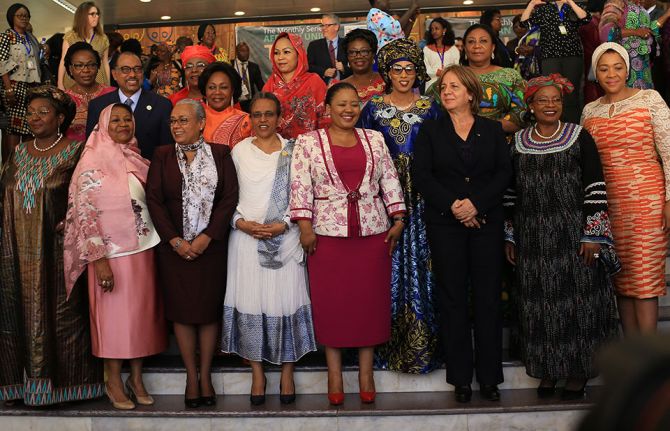
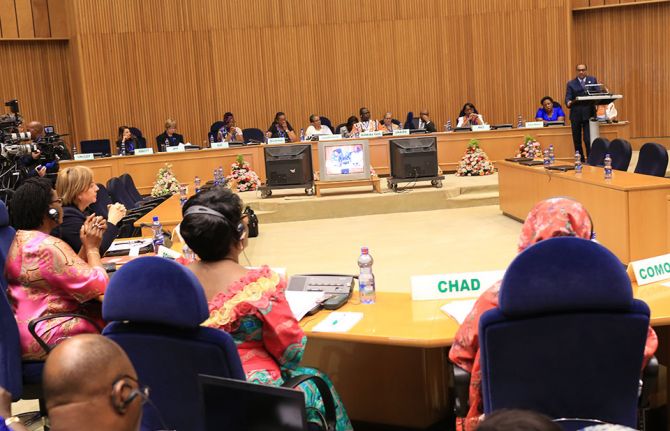
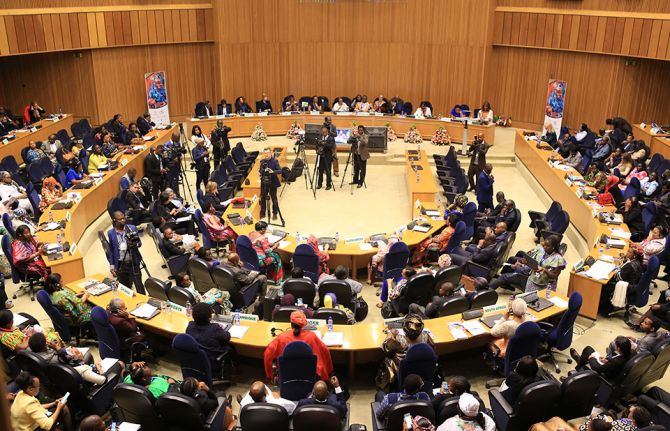
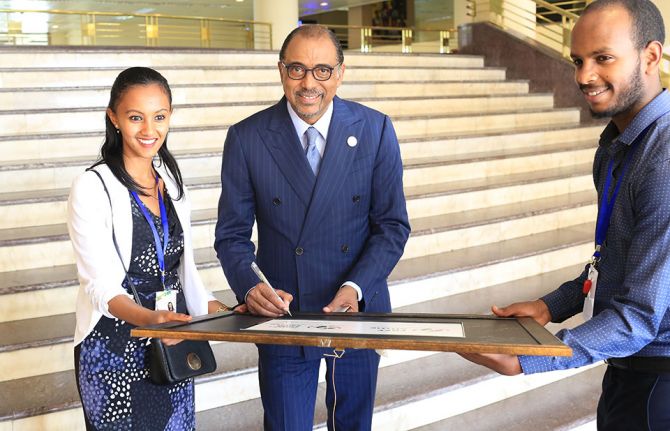
Update
African first ladies and the African Union launch Free to Shine
06 February 2018
06 February 2018 06 February 2018First ladies across Africa are spearheading a campaign to stop children acquiring HIV, prevent AIDS-related deaths and keep mothers healthy across Africa.
The Free to Shine campaign was launched by the Organisation of African First Ladies Against HIV/AIDS (OAFLA) and the African Union on the sidelines of the 30th Ordinary Session of the African Union in Addis Ababa, Ethiopia. It was launched during OAFLA’s annual General Assembly, which this year included 20 first ladies from across Africa, joining under the theme of “Transforming Africa through prioritizing children, adolescents and mothers in the fight against HIV”.
The Free to Shine initiative was inspired by the progress and commitment from across Africa on stopping new HIV infections among children and aims to build on this progress by uniting people and organizations at the local and global levels to advance progress in ensuring access to HIV services to end AIDS among children and keep mothers healthy.
STAT BOX
In 2016, around 160 000 children became newly infected with HIV.
Without treatment most children born with HIV will die before their fifth birthday.
In 2016, less than half (43%) of all children living with HIV had access to treatment.
The campaign’s goals include improving maternal and childhood HIV programmes across Africa by building networks and partnerships, advocating for domestic and global resource mobilization, raising awareness around HIV prevention and mobilizing support for childhood AIDS programmes in Africa by working with high-level international and regional bodies and forums.
The Free to Shine campaign, led by OAFLA and the African Union, is supported by UNAIDS, the World Health Organization, Abbott, the Elizabeth Glaser Pediatric AIDS Foundation, the United Nations Children's Fund, the United Nations Development Programme and AIDS Accountability International.
Quotes
“Preventing new HIV infections will transform Africa’s broader health and development agenda and provide our children with a healthy and hopeful future.”
“UNAIDS is proud to continue to accompany the Organisation of African First Ladies against HIV/AIDS and the African Union and I know HIV will remain high on your agenda because ending AIDS will have an impact across the whole development spectrum.”
Related resources
Related

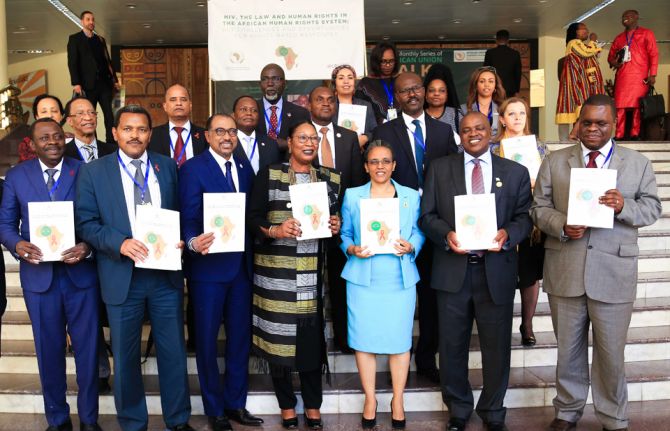
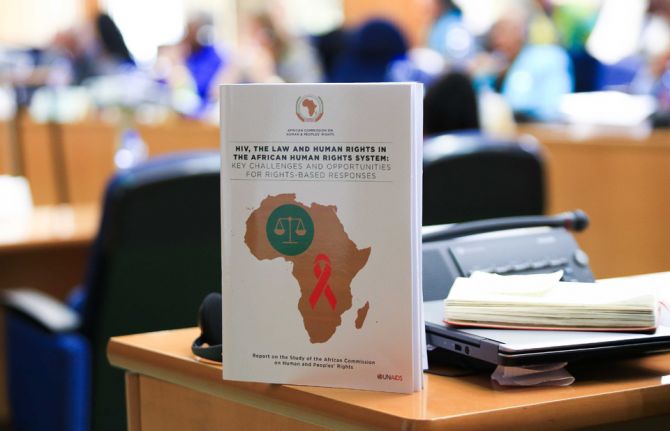
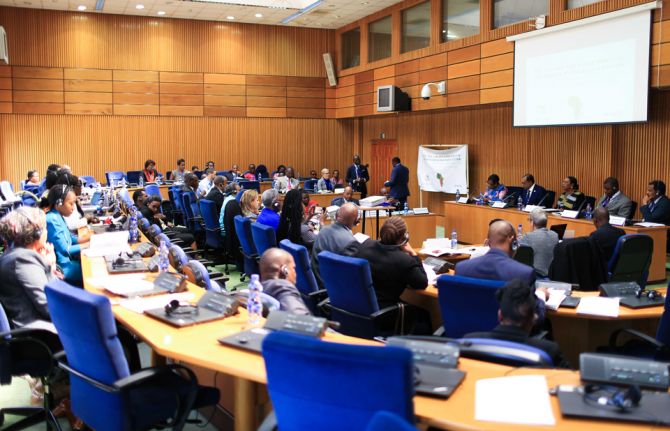
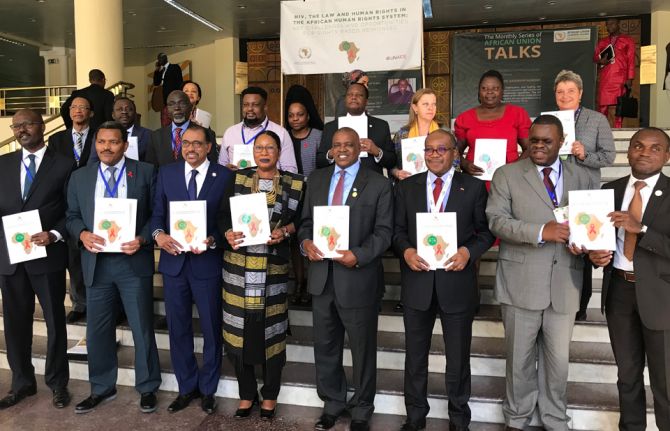
Update
African human rights body urges renewed efforts on human rights in response to HIV
31 January 2018
31 January 2018 31 January 2018On 27 January, the African Commission on Human and Peoples’ Rights (the African Commission) launched a groundbreaking report, HIV, the law and human rights in the African human rights system: key challenges and opportunities for rights-based responses.
The report addresses the key human rights challenges in the response to HIV, including inequality and discrimination towards people living with HIV, access to treatment and restrictive intellectual property regimes, conflict and migration, coercive HIV testing and counselling, restrictions on civil society and the criminalization of people living with HIV and key populations.
While noting the progress made in the response to HIV in Africa, the report expresses concerns about the populations left behind—young women and girls, prisoners, sex workers, men who have sex with men, transgender people and people who use drugs.
As well as the challenges, the report also highlights good practices from across the continent for responding to them, including law and policy reform, progressive court decisions and programmes to advance human rights protection and access to HIV and health services.
The development of the report is the result of three years of work involving inputs from various stakeholders, including people living with and affected by HIV, civil society and members of key populations.
A launch event held during the 30th Ordinary Session of the African Union was attended by the First Lady of Ethiopia in her capacity as Chairperson of the Organisation of African First Ladies against HIV/AIDS and by the Vice-President of Botswana, the Chairperson and Vice-Chairperson of the African Commission and the Executive Director of UNAIDS.
The participants welcomed the comprehensive report on HIV and human rights and its bold recommendations and committed to support the implementation of the report’s recommendations to advance human rights and social justice in the response to HIV in Africa.
Quotes
“This report salutes Africa’s progress against HIV. But it also reminds us that the job is not yet done. The report calls for renewed efforts to address stigma and discrimination and to pay greater attention to the effective and full protection of the human rights of all the populations that are marginalized and left behind in our communities.”
“The law and human rights are incredibly important in the context of global health, and they are essential to an effective response to HIV. This report makes the basic point that we must place people, rights and communities at the centre of the response to HIV. It is great to see the African Commission on Human and Peoples’ Rights speak so boldly on zero discrimination and the right to health through this report.”
“I welcome this report, which addresses issues that are so important to the Organisation of African First Ladies against HIV/AIDS, including ending discrimination, combatting gender inequality and advancing access to HIV prevention, treatment and care services for all.”
“Côte d’Ivoire has made important progress against HIV and the response to the epidemic continues to mobilize the highest level of government. We are committed to strengthening our efforts against HIV discrimination and to advance access to justice to end AIDS.”
“From the beginning, we had recognized the importance of engaging the African Commission on Human and Peoples’ Rights and supporting its work on HIV. We are pleased to have partnered with the African Commission, UNAIDS, the AIDS and Rights Alliance for Southern Africa and other allies to support the report. We will continue working to ensure that recommendations are used by our communities to advance human rights protection and access to health services.”
Related


Update
Harnessing human rights for the AIDS response
18 January 2018
18 January 2018 18 January 2018A special section on HIV and human rights has been published in the Health and Human Rights Journal. Eleven papers—covering issues such as HIV-related stigma and discrimination, gender inequality and the effects of the abuse and criminalization of key populations—offer critical reflections on the AIDS response and call for renewed efforts to confront legal, social and structural barriers in order to realize better health for all.
The papers leverage the experience of the HIV response and give innovative and practical approaches to expanding human rights programmes and access to treatment and for integrating human rights in work on eliminating diseases.
The special section conveys the simple message that there will be no end to AIDS without efforts to build on the rights-based lessons of the past. It also emphasizes that there is a need to find innovative ways to expand protections, promote gender equality, support civil society and community engagement, strengthen accountability and close the inclusion gap.
The special section is accessible at https://www.hhrjournal.org/volume-19-issue-2-december-2017/
Quotes
“The journal special section on health and human rights describes and reflects on the progress made in realizing human rights as an imperative for health. It allows us to reflect on how the HIV epidemic has transformed our understanding of the structural, legal, and social determinants of health and the approaches to address them.”
Publications
Related

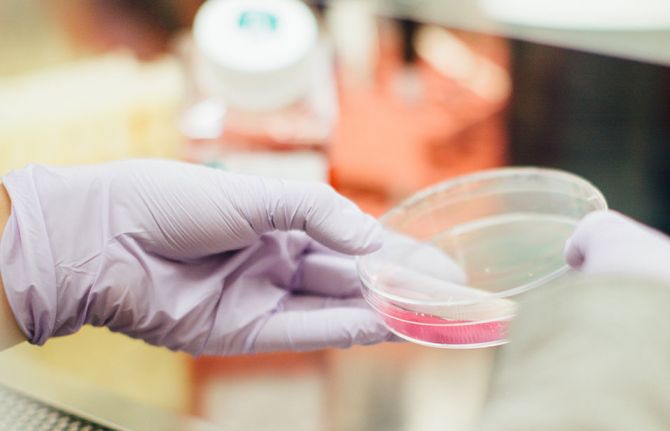
Update
How do investment vehicles and innovations work together to deliver better health care?
22 January 2018
22 January 2018 22 January 2018UNAIDS, ICV, Johnson & Johnson, BD and the Center for Global Health and Diplomacy are hosting a forum entitled Transformational Aid for Development in order to create connections for scaling up innovations and investments for health and to reach vulnerable populations.
The Transformational Aid for Development forum will initiate a discussion with heads of United Nations agencies, chief executive officers of investment firms, ministers of health and representatives of the private sector, including from the pharmaceutical, diagnostics, information technology and investment sectors. These stakeholders will answer the question, “How do investment vehicles and innovations work together to deliver better health care to millions of people across the globe?”
During this one-day strategic forum, government ministers will describe the gaps and challenges they face in their respective countries, chief executive officers from family offices and investment firms will discuss which sectors they intend to invest in and private sector representatives will discuss where they will implement new technologies, diagnostics and pharmaceuticals.
The forum is being held on 22 January 2018 in Geneva, Switzerland.
Resources

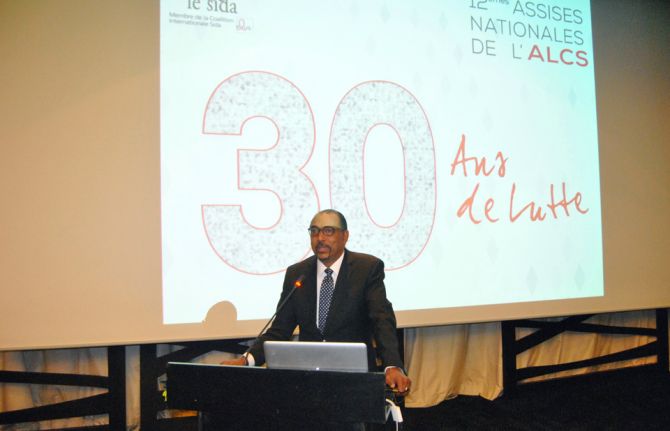


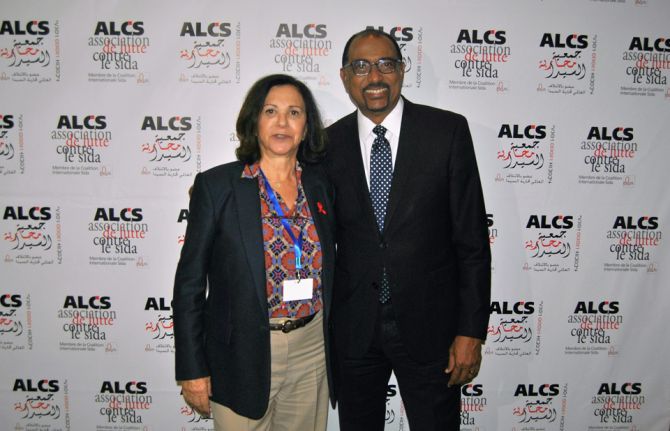
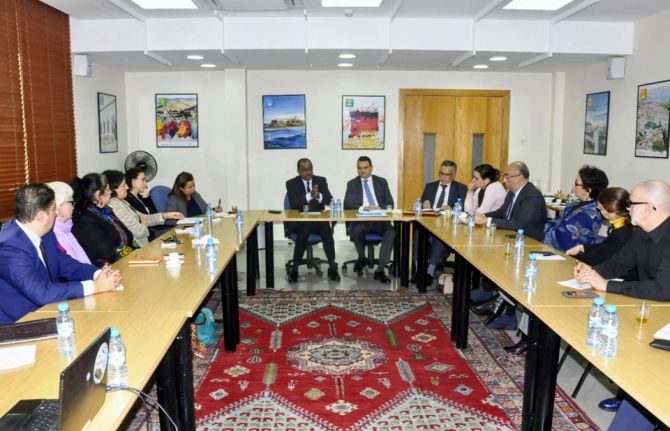
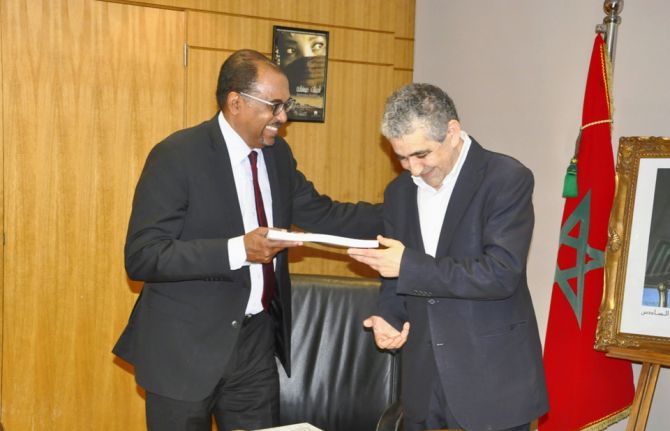
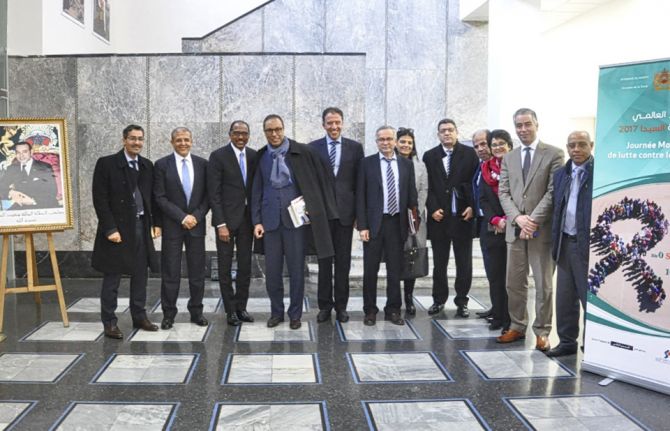
Update
A 30-year response to HIV in Morocco
19 January 2018
19 January 2018 19 January 2018Morocco marks 30 years of its response to HIV in 2018, with much to celebrate. Concerted efforts in the country have resulted in a 42% reduction in new HIV infections since 2010, significantly greater than the decline across the Middle East and North Africa of just 4%. HIV treatment coverage has also increased in the country, from 16% in 2010 to 48% in 2016.
Morocco has also managed to keep HIV prevalence low among the general population (0.1%). However, there are areas of serious concern. Data show that HIV prevalence is high among populations at higher risk of HIV infection, such as female sex workers (1.3%), people who inject drugs (7.9%) and migrants (3%), showing the need to do more to reach key populations with HIV services. Morocco is scaling up efforts to reach key populations through combined prevention programmes, substitution treatment for people who use drugs and increasing HIV testing.
The Executive Director of UNAIDS, Michel Sidibé, visited Morocco to show his support to the 30-year response to HIV. During the visit he met with the President of the National Council of Human Rights (CNDH), the Secretary-General of the Ministry of Health, the Minister of Foreign Affairs and International Cooperation and the United Nations Resident Coordinator and Country Team.
He stressed the importance of the United Nations Country Team’s commitment to United Nations reform and to responding to HIV through the Joint Plan. He noted the importance of having a national strategy on human rights and HIV and congratulated the CNDH as a pioneer in the region. He praised the initiative of the CNDH for carrying out training in human rights and citizenship and highlighted the important role that Morocco can play in efforts to recruit 2 million community health workers in Africa and in encouraging the local production of medicines.
Mr Sidibé congratulated the Minister of Foreign Affairs and International Cooperation on the progress of the AIDS response under the leadership of King Mohammed VI, the government’s partnership with civil society and the increase in domestic funding for HIV.
Mr Sidibé took part in the opening ceremony of the 12th meeting of the Association for the Fight against AIDS (ALCS) to celebrate the 30-year response. ALCS has been at the forefront of the response to HIV in Morocco, working on prevention for key populations, HIV counselling and testing, psychosocial support, advocacy, resource mobilization and introducing new innovations, including community screening and pre-exposure prophylaxis.
At the end of 2016, there were estimated to be 22 000 people living with HIV in Morocco, fewer than 1000 new HIV infections and fewer than 1000 AIDS-related deaths. UNAIDS is working closely with Morocco to expand innovative approaches to HIV prevention and testing for key populations, expand antiretroviral treatment services and their integration into the health system, implement a road map to eliminate mother-to-child transmission of HIV and implement a strategy for zero discrimination. UNAIDS also coordinates the United Nations Joint Support Plan and works to ensure the availability of strategic information and mobilize and implement grants from the Global Fund to Fight AIDS, Tuberculosis and Malaria.
Quotes
“Morocco is a model for other countries and will reach the 90–90–90 targets by 2020. It is important to be optimistic; I am an incorrigible optimist.”
“Morocco highly appreciates what is being done by UNAIDS at the international and national levels.”
“We know that we are on track and that we must not relax efforts in prevention and access to treatment, for why not succeed in ending the epidemic in our country by 2030.”


